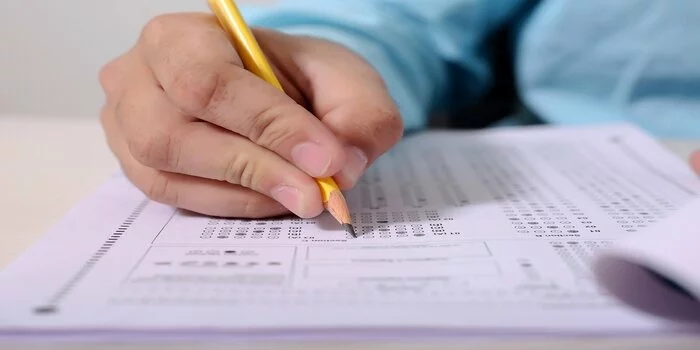BITSAT Syllabus 2021 – BITS Pilani will release the syllabus of BITSAT 2021 that candidates need to follow when making preparation for the exam. The BITSAT 2021 syllabus will provide details on the subject-wise topics they need to prepare for the exam. The BITSAT 2021 question paper will include five sections – Mathematics ( or Biology), Physics, Chemistry, English Proficiency, Logical Reasoning. Considering not all subjects carry the same weightage, the candidate should use their good sense when preparing for the topics given in the BITSAT syllabus 2021. For example, instead of spending prodigious time of English or Aptitude section, one would be better served by focusing more on PCM (or PCB) subjects. Go through the rest of the article to learn the full details of BITSAT 2021 syllabus.
BITSAT Syllabus 2021 – Subject-wise topics
| Subject | Topics |
| What will be the BITSAT syllabus based on? | It will be based on NCERT syllabus of Class 11 and 12 |
| Physics | Units & Measurement Kinematics Newton’s Laws of Motion Impulse and Momentum Work and Energy Rotational Motion Gravitation Mechanics of Solids and Fluids Oscillations Waves Heat and Thermodynamics Electrostatics Current Electricity Magnetic Effect of Current Electromagnetic Induction Optics Modern Physics Electronic Devices |
| Chemistry | States of Matter Atomic Structure Thermodynamics Physical and Chemical Equilibria Electrochemistry Chemical Kinetics Hydrogen and s-block elements p- d- and f-block elements Principles of Organic Chemistry and Hydrocarbons Stereochemistry Organic Compounds with Functional Groups Containing Oxygen and Nitrogen Biological , Industrial and Environmental chemistry Theoretical Principles of Experimental Chemistry |
| English Proficiency | Grammar Vocabulary Reading Comprehension Composition |
| Logical Reasoning | Verbal Reasoning Nonverbal Reasoning |
| Mathematics | Algebra Trigonometry Two-dimensional Coordinate Geometry Three dimensional Coordinate Geometry Differential calculus Integral calculus Ordinary Differential Equations Probability Vectors Statistics Linear Programming Mathematical modelling |
| Biology | Diversity in Living World Cell: The Unit of Life; Structure and Function Genetics and Evolution Structure and Function – Plants Structure and Function – Animals Reproduction, Growth and Movement in Plants Reproduction and Development in Humans Ecology and Environment Biology and Human Welfare Biotechnology and its Applications |
| To download DETAILED BITSAT Syllabus 2020 – Official | Click here |
| To download VITEEE 2020 Information Brochure (with syllabus) | Click here |
BITSAT Syllabus 2021 – Significance
- Questions in the BITSAT exam will be asked as per the BITSAT 2021 syllabus released by exam officials.
- The candidate when preparing for the exam, must only follow the topics given in the syllabus, but see which subjects or topics carry more weightage.
- For example, among the five subjects, Mathematics (Biology) carry maximum marks or weightage, followed by Chemistry and Physics, which carry equal weightage.
- In comparison, the English and Aptitude sections carry the lowest weightage.
- So, when preparing for the exam, it is not prudent to blindly follow the BITSAT syllabus, as one needs to take these things into context.
- The BITSAT 2021 merit list for admission will be prepared using marks obtained by candidates in the entrance exam.
Also Read:
BITSAT Admit Card 2020
BITSAT Cutoff 2020
Assam CEE Cutoff 2020
BITSAT Eligibility Criteria 2021
BITSAT Exam Pattern 2021
The candidate taking the exam must follow the exam pattern of BITSAT 2021 to get as to how to prepare for the exam.
BITSAT 2021 Exam Pattern
| Particulars | Details |
| Mode of Exam | Online Computer Based Test (CBT) |
| Duration | 3 Hours |
| Type of questions | Multiple Choice Questions (Objective). |
| Sections | Part I – Physics Part II – Chemistry Part III – English Proficiency and Logical Reasoning Paper IV – Mathematics/Biology (for B.Pharma) |
| Section-wise questions | Mathematics ( or Biology) – 45 Physics – 40 Chemistry – 40 English Proficiency – 15 Logical Reasoning – 10 |
| Total questions | There will be total 150 questions |
| Additional questions: | The candidate can attempt another 12 questions if they complete the allotted 150 questions This will allow the candidate to score higher But note that there is negative marking |
| Time limits for subjects | There is no section-wise or subject-wise time. |
| Marking Scheme | 3 mark to be awarded for every correct answer1 mark to be deducted for an incorrect answer0 marks for a question that is not attempted |
| Medium of exam | English |




